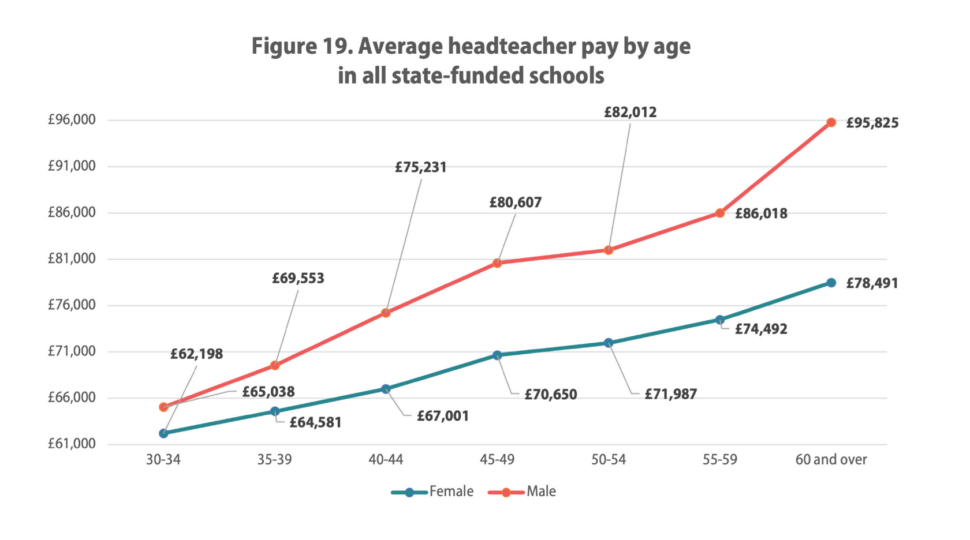Women in school leadership earn around £17,000 less than men by the end of their careers, according to new analysis of the gender pay gap in education.
A report by school leadership unions ASCL and NAHT, along with the National Governance Association and WomenEd, found that the gender pay gap is more than four times larger for leaders than for classroom teachers, and that it increases with age and seniority in roles.
Analysis by the four groups of Department for Education school workforce statistics found that male headteachers over 60 earned on average £95,825, while their female counterparts earned just £78,491. This is a difference of £17,334, or around 20 per cent.
This is because at headteacher level, women tended to have “steadier increases in salary by age”, whereas men “tend to see much larger increases, particularly towards the end of their career”.
The analysis found a similar pattern at other leadership levels. The average pay gap between women and men increases from £2,760 at 35 to 39 to £4,024 at age 40 to 45.

Gender gap 4 times larger for female heads than teachers
Woman headteachers across all ages already face a greater gender pay gap than classroom teachers. According to the analysis, male teachers earned 2.4 per cent more on average than women, whereas male headteachers earn 11.3 per cent more than women in the same roles.
The gender pay gap for full-time employees nationally is 7.9 per cent as of this April, but 11.9 per cent among the over-60s.
Vivienne Porritt, co-founder and global strategic leader of WomenEd, said her organisation had heard “many examples where women are paid less than men for the same role and with the same or greater experience”.
“This report shows that such inequality is more significant than women realise.”
The report also found that the gender pay gap varied by type of school, with female heads of special and alternative provision academies earning on average £4,165 less than men. And in secondary academies, male heads earned £3,399 more than their female counterparts.
According to the analysis, there are several contributing factors to the pay gap across the sector. Women are more likely to manage caring responsibilities, and career breaks “can have a negative impact on pay and career progression which can be a particular issue for female teachers on maternity leave”.
Other factors include individuals being appointed at different points on pay scales, different job and grade titles for “virtually the same jobs” and performance-related pay being “unfairly awarded”.
Calls for action on ‘sobering’ figures
Paul Whiteman, general secretary of the NAHT, said the figures in the analysis “should be sobering to anyone that reads them”.
“We’ve seen school leadership pay eroded over the last decade and for our female school leaders there is almost a ‘double hit’ by the inequalities in the system.”
Geoff Barton, from ASCL, said the report had exposed “stark differences in education salaries which we simply must do more to address”.
The report recommends that the government improves national level analysis of pay gap trends, including a change so that it includes executive heads and trust chief executives.
Government should also act on calls from the School Teachers’ Review Body and the sector for a “comprehensive review” of the pay framework for teachers and leaders, and provide greater support to help mitigate “some of the systemic barriers” to flexible working.
Schools and trusts should seek to understand the situations in their organisations, the report said. Those not legally required to undertake pay gap collections should still collect and analyse data “for internal purposes”.
Where gaps are found, schools and trusts should create a plan to reduce it. They can also help by removing requests for current salaries from recruitment materials and requests for references.
The report also urges governors to review recruitment policies, hold regular reviews of pay policies and setting procedures and review the diversity of their governance teams.
Emma Knights, chief executive of the NGA, said schools needed to “encourage and reward all the talent within schools and trusts”.








Your thoughts